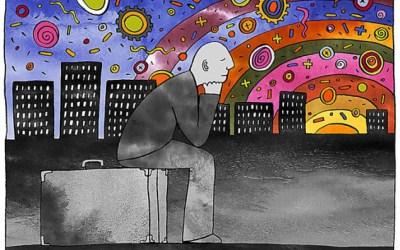Russian-born Israelis are moving west, seeking a better future
`Life here is simpler’
Gennady is a former career soldier in an IDF teleprocessing unit. “I’m crazy about Israel, but I don’t see us returning,” he says. “Maybe to be buried or to retire. Life here is simpler and simplicity means money. We are no longer living in a small apartment but instead are in a house on a huge lot, and we have two cars.”
He chose Canada, he said, because “its gates are still relatively open.” More formally, this means Canada permits immigrants with skills that match an approved list of professions to settle in the country.
Halifax has become a colony of sorts for Israeli immigrants with roots in the former Soviet Union. “We are from the second batch to arrive from Israel and recently the fifth batch has come here,” he explained.
“There is a Jewish community of about 5,000 people here, at least 60 percent of whom are Russian-speaking Israelis.” The emigration of Gennady and Nili is in keeping with Israeli Central Bureau of Statistics data from 2008 that showed that 48 percent of emigrants from Israel were originally from the former Soviet Union.
Most of those who left were young, educated, middle-class people who were frustrated with the economic and employment situation in Israel. A more current breakdown from the Central Bureau of Statistics, released about six months ago, showed that 28 percent of immigrants from the former Soviet Union who had earned doctorates in Israel had been living abroad for at least three years.
The sense that this phenomenon was growing was expressed by Igor Teller, an engineering graduate of the Technion, Israel’s Institute of Technology. He wrote a column for the Ynet website entitled “Pavel’s in Canada, Yuri’s in Australia,” a reference to the two preferred destinations of Israeli Russian speakers. “Every year, more than five names of dear people, friends of mine who are scattering on the face of the earth, are added” to the list, Teller wrote.
Political-culture researcher Michael Filipov came to a similar conclusion with respect to the accelerated flight of young Russian speakers. For this he needed no formal research. It was enough for him to wait for his annual army-reserve callup, to a unit in which most of the soldiers were from the former Soviet Union. He noted that the number of his friends dwindled with every callup.
This time around he discovered he was the only Russian soldier left. “People talk about a million immigrants from the Soviet Union, but current statistics show that in practice there are only about 730,000 immigrants in Israel at this time,” Filipov explained. He added that mortality among the immigrants, many of whom came to Israel at relatively advanced ages, is also shrinking the Russian-speaking immigrant community.
Economic disappointment
Speaking of the disaffected Russians, Filipov said he “wouldn’t relate to these folks as immigrants who were not absorbed. They studied here, served in the army. This is their country, but they are [disappointed about the] cost of living and their protest is not expressed in the streets but rather by leaving.
“The problems experienced by the young, secular middle class are growing when it comes to the immigrants. Unlike a native-born 30-year-old Israeli who is trying to buy an apartment and can milk his parents,” immigrants don’t have that option, he says. “That is why the response is more extreme. Instead of complaining, they pack their bags.
“Leaving isn’t necessarily the result of severe distress in managing. I’m also talking about the 30-year-old Technion graduate who had thought that he would have a certain standard of living, and when his expectations were not met, he decides to meet them elsewhere. It’s a pragmatic generation with a very materialistic perspective.”
Hilo Glazer

